What to look for when buying a farmyard CCTV system
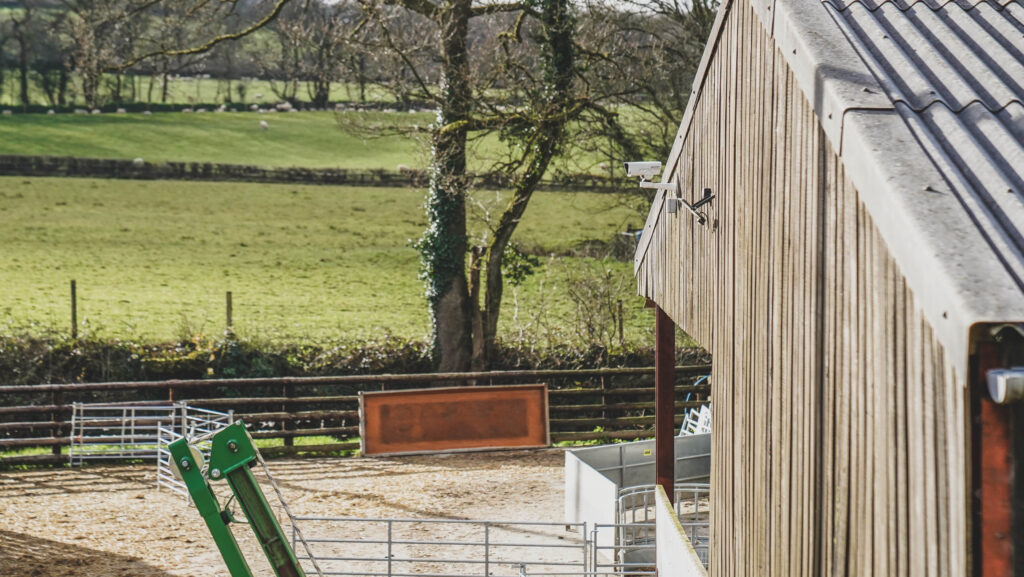 © Closewatch
© Closewatch As the nights grow longer, darker and danker, so does the window of opportunity for unscrupulous ne’er-do-wells to pilfer from farmyards.
Sadly, there’s no single answer to keeping undesirables out, but a decent CCTV system can act as both a deterrent and an aid for catching any perpetrators.
Not only that, having footage of a robbery taking place can pay dividends when processing a claim with your insurance company.
See also: Ultimate guide to farm security kit
How to choose
But where do you start? The internet is awash with camera systems from a few quid to several thousand, making it a nightmare to work out what’s good, what’s bad and what’s unnecessary.
The failsafe method of getting a high quality and secure camera kit is to pay a professional installer to design and fit a system for you.
If going down this route, look for firms with NSI or SSAIB accreditation that ideally have experience of installing on farms.
Obviously, this is the most expensive approach. But these outfits have the technical nous to put a reliable system together and set up more advanced features.
For those happy to do the installation work themselves, it’s possible to save some cash by buying a farm-specific CCTV kit.
These have the benefit of being assembled by a firm that knows what they’re doing and there’ll be some backup available if needed.
Cheaper still are generic kits, which can be purchased online for a couple of hundred pounds.
And there’s always the option of scouring the internet to amass all the components individually – see “Full DIY system” below.
Even cheap standalone cameras can provide some cover.
However, it’s worth buying from a reputable brand to reduce the risk of the camera being accessed by hackers.
Here, we take a look at the types of system on offer and what you can get for your money.
Professionally installed systems
Dundee-based Farmer’s Eye has been installing CCTV systems on agricultural premises for 14 years.
Owner Chris Cotton says installations vary massively depending on the type of business and setup of the yard, but there are some basic principles that he applies to all.
Firstly, he tends to favour high-quality static cameras over more expensive pan, tilt and zoom (PTZ) models.
Although these can’t move to follow an intruder, they cost a fraction of the price, meaning more can be fitted to achieve greater overall coverage.
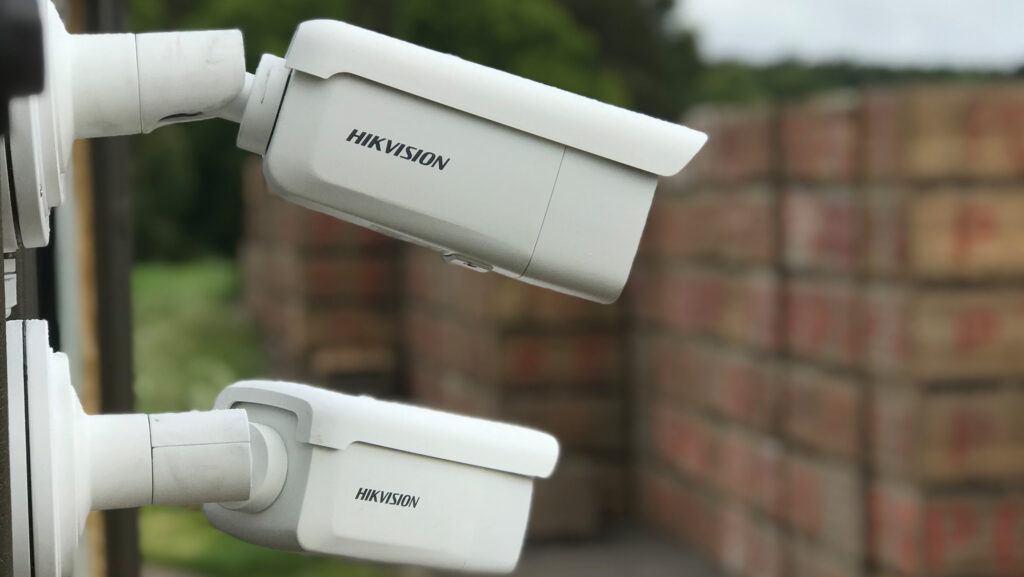
© Hikvision
Chris recommends installing cameras from a reputable manufacturer as these are more cyber secure, offer high-definition images and usually have longer warranties.
“Almost any modern CCTV camera will give decent images during the day, but the better ones come into their own at night, which is when they’re generally needed most,” he says.
Good sealing against moisture and dust are also important features for cameras used in a yard.
Intelligent technology
And he favours “intelligent” IP cameras over more basic analogue models as these come ready installed with high-end features such as motion detection and active deterrents.
This means they can play automated recorded messages, alarms or sirens to intruders, as well as allowing users to issue their own verbal warnings.
They can even turn on yard lights or flash their own integrated strobe.
ANPR (automatic number plate recognition) technology
Another type of camera that can be employed is one fitted with ANPR (automatic number plate recognition) technology.
These keep a log of all vehicles that have driven into the yard and can even be used to control access through an electric gate.
They are expensive though – from about £400 just for the camera – meaning they’re usually only justifiable for sites with large amounts of traffic.
Wiring
Like most CCTV systems, the images from each camera are sent back to a network video recorder, which is typically positioned in the farmhouse.
One of the challenges is finding a reliable method of transferring the data from each camera to this unit.
Old-school wired connections are the most cost effective and are generally very reliable, but they’re only really suitable for installations where the house and farm buildings are relatively close to one another.
Another consideration with a wired setup is concealment of the wires to prevent more tenacious criminals finding and snipping them.
More commonly, Chris uses a wireless bridge to beam signals over longer distances.
This is secure and reliable but, as a failsafe, individual backup recordings are made for each camera.
Finally, there’s the option of a 4G link.
This lets you get real-time access to cameras on steadings where there is no regular internet but does have the disadvantage of having an ongoing cost of paying for a sim card.
The video network recorder itself performs several roles. First, it allows users to view the footage, either on a screen in the house, or remotely on a smartphone/tablet.
But it’s also able to send text alerts if motion is detected, either using standard sensors, or a more sophisticated AI setup.
Some users get fed up with the former as they can get peppered with alerts every time a rabbit or bird is picked up.
But the AI version can weed out this sort of activity and only send notifications when a person or vehicle is detected.
For those regularly targeted by thieves, Farmer’s Eye also offers a remote service where a security team monitors the premises 24 hours a day and contacts the police if they see any activity.
They’re also able to issue live verbal warnings.
Enforcement teams
For even higher levels of security, so-called enforcement teams can be employed; they will drive to the farm and secure the premises.
Farmer’s Eye installs systems in Scotland and northern England, with prices typically ranging from £2,000 to £5,000.
Those in other parts of the country can purchase kits for self-installation and the firm will give advice on how to fit them.
It also sells standalone cameras for monitoring livestock in buildings.
These are often the same models as its security cameras, meaning extra units can be added at a later date to form a more comprehensive CCTV system.
Other similar CCTV firms are situated throughout the UK, so it should be relatively straightforward to find one that carries out installations in your area.
Farm specific kits for self-install
Closewatch specialises in farm CCTV kits for self-installation, which it sends out preconfigured so that minimal faff is required for those fitting them.
Its four-camera system costs £2,496, with one high-spec PTZ doing the heavy lifting, backed up by three static models.
All of these are made by Hikvision which, according to the firm, are the best you can get.
The PTZ camera is designed for being trained in a driveway, with 42x optical zoom, 360deg panning and pin-sharp night vision that allows a numberplate to be read in the pitch dark at 60m.
Overall reach is up to 500m.
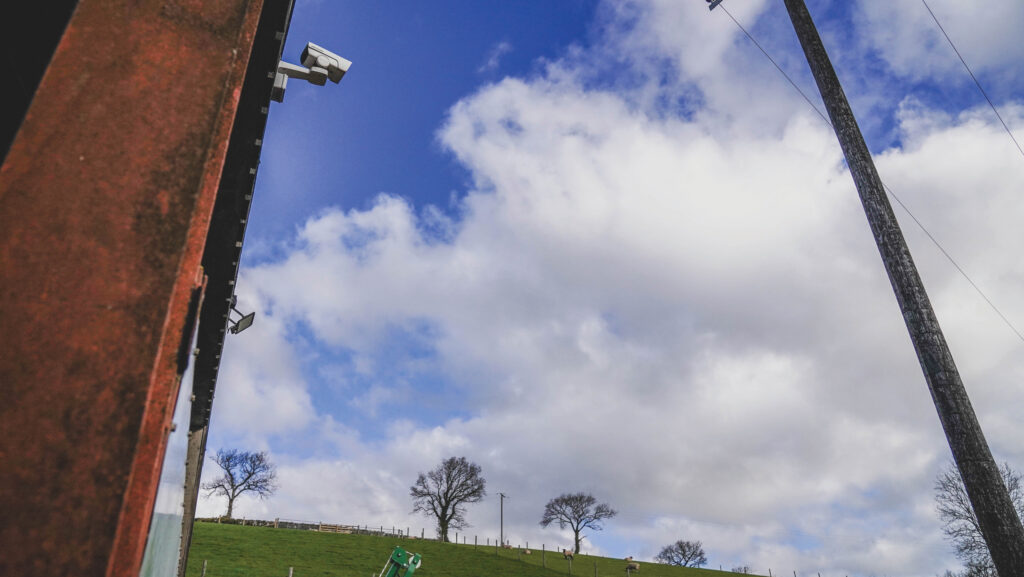
© Closewatch
Static models offer similarly crisp footage with twice the image quality of full HD and up to 50m of night vision.
Unlike some cheap cameras that can be “blinded” by a torch being shone at them, all of these models have a system that instantly engages daytime mode.
This allows them to continue capturing the intruder’s activity, before seamlessly reverting back to night mode once the light level drops.
At the same time, the cameras send a heightened alert to the user, warning them that intruders are around.
Several smart features are incorporated into the cameras, such as intelligent motion detection and the ability to sound alarms.
However, there’s no “talk back” facility that allows the user to issue their own warnings.
Each camera relays its footage to a network video recorder via POE (power over ethernet cables) or, if longer distances need to be covered, a wireless bridge.
These can be had with a 300m (£95) or 2km (£120) range and have a complex channel switching system to thwart any attempts to block the signal.
A 4G option is also available, but this is generally used for standalone livestock cameras in remote buildings.
The network video recorder included in this kit has eight channels, meaning buyers have the ability to add four more cameras at a later date.
Footage can be viewed through a screen connected to the recorder or remotely on a smartphone or tablet. It’s also possible to control the PTZ camera from these devices.
Generic kits
There are scores of lower-cost CCTV kits available to purchase online, one provider of which is Swann.
It offers domestic systems with four cameras for less than £200 and higher spec setups for business use starting at roughly double that figure.
The latter are available in several packages with varying numbers and specifications of camera.
The Master Series kit costs £420, including four 4k cameras with heat and motion sensing spotlights, red and blue flashing lights and night vision of up to 40m.
There’s also an eight-channel network video recorder with integrated 2TB hard drive, cables and access to the Swann Security app for viewing footage remotely.
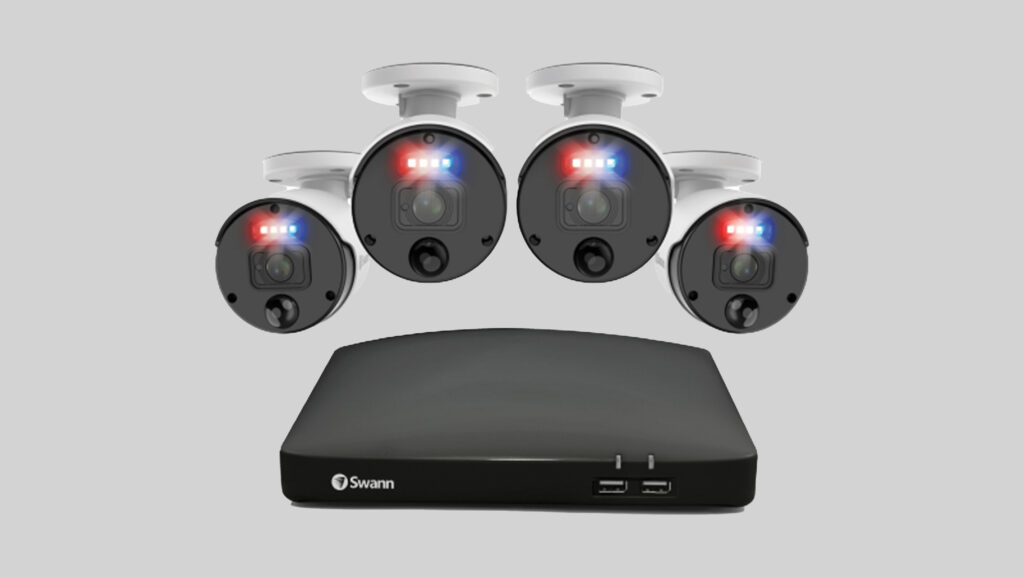
© Swann
Extension cables can also be purchased where the cameras need to be installed further from the recorder and extra cameras can be added, including PTZ models.
Systems such as this are unlikely to match the performance of higher specification setups, but they could prove a cost-effective option in some situations.
Swann also offers a range of wi-fi cameras, solar powered models, doorbell cams, alarms and security lighting.
Full DIY system
For the technically minded it’s possible to save some cash by buying all the components for a CCTV system separately.
This was the approach taken by Hertfordshire farmer and marine engineer Giles Teggin who built his own remote setup housed in a shipping container.
It’s based around three 5MP static cameras featuring colour-enabled night vision, motion detection, bi-directional sound detection and a range of up to 40m.
They also have a “talk back” facility, meaning he can issue verbal warnings to intruders.
These are high-spec commercial models made by Ony-X, which he says give excellent image quality, even in the dark. However, they cost him only about £50 apiece.
Each is 4G enabled, so they can upload footage to a cloud-based server via a 4G modem installed in the container.
This gives Giles a live view of the camera feeds via a smartphone/tablet app or web browser from anywhere in the world.
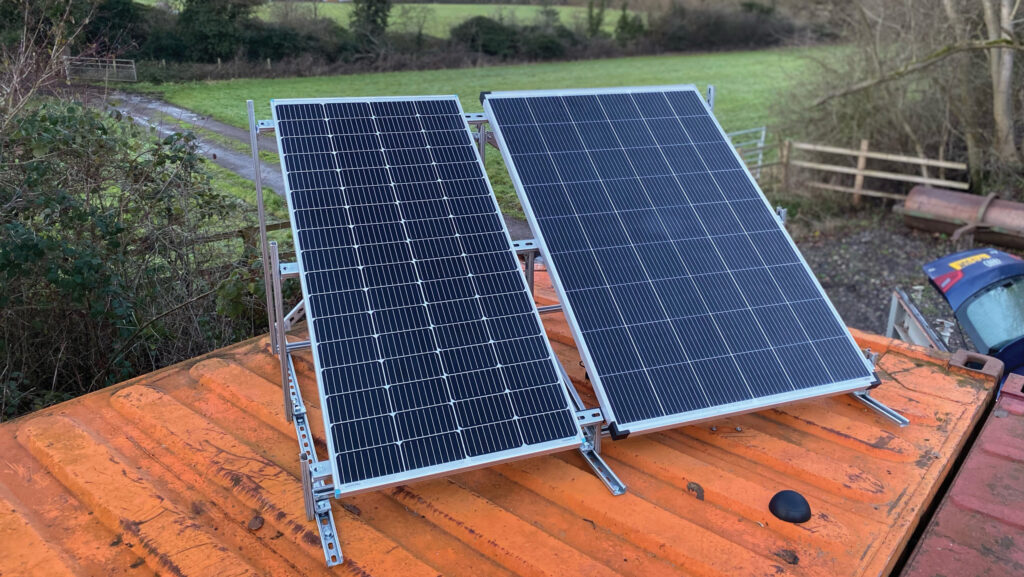
© Giles Teggin
The cloud service is provided by an independent company called Webeye, which is compatible with almost any brand of camera and only costs a few pounds a month.
In addition, the cameras are fitted with SD memory cards so that all footage is backed up if the web signal drops out.
As for the modem, this is made by Telephonica and has slots for two sim cards.
Helpfully, there is good signal in the area, so he’s only needed to fit one from Three mobile that has a monthly fee of £11 a month for 12GB of data.
This is plenty for the camera footage, and there’s enough in reserve to use it as a yard-based internet connection for other devices.
To prevent tampering, two of the cameras are safely installed inside the container with openings for them to see out.
The whole setup runs off a set of solar panels mounted on the roof that top up 12V leisure batteries via a charge controller.
For added convenience, he’s included an inverter to convert 12V DC into 240AC, which can be used to charge power tool batteries.
The setup provides plenty of power in summer months, but the batteries can run low in the winter.
For this reason, Giles is considering upgrading to higher performing lithium-ion versions, and possibly increasing the size of the solar panels.
General CCTV installation tips
- Get the highest resolution cameras with the best night vision you can afford – more detail means you can do more with the footage
- Buy from a reputable supplier to ensure you have a cyber secure product
- Position cameras where they are hard to tamper with
- Hide cables to reduce the risk of them being cut
- Secure the farm’s electricity supply so thieves can’t easily cut the power
- Put up CCTV signs and check if you need to register with the Information Commissioner’s Office – most businesses are required to do this and pay an annual fee of £35 to £55 by direct debit

